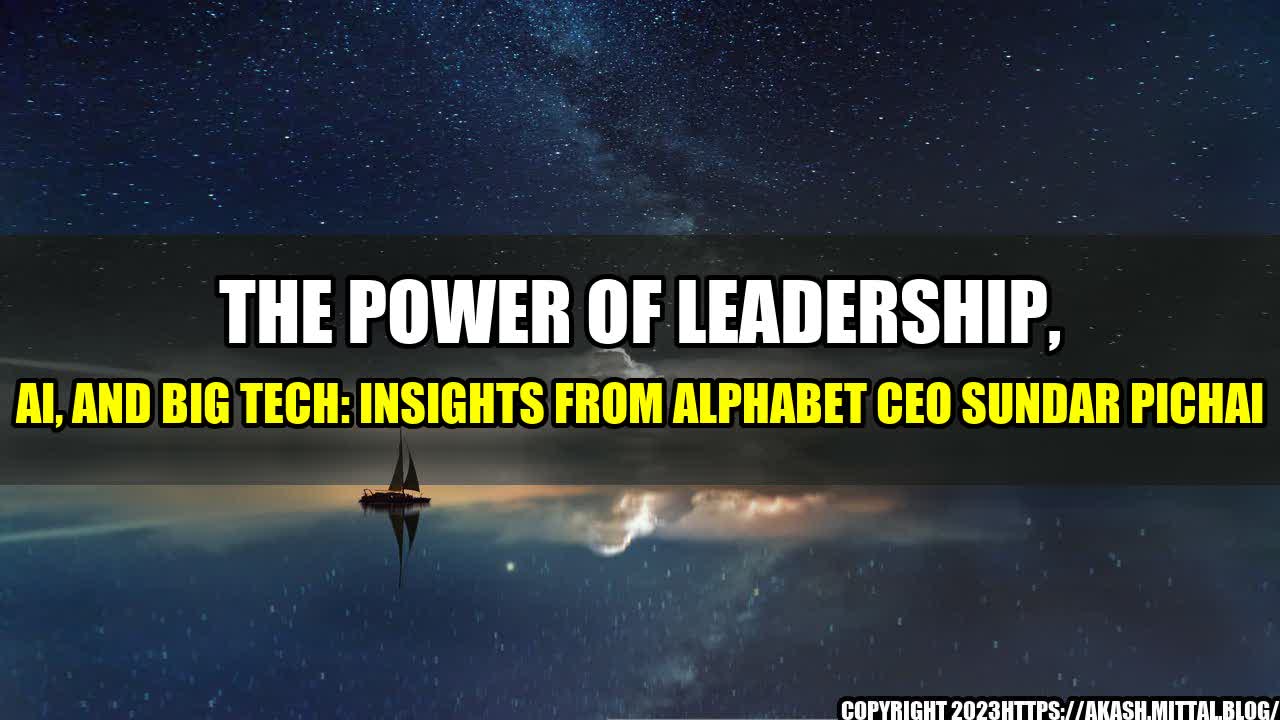At the helm of Alphabet, one of the world's most powerful tech companies, Sundar Pichai has a unique perspective on the intersection of leadership, AI, and big tech. His journey to the top is an inspiring story of hard work, determination, and a passion for technology that has shaped his vision for the future.
Born and raised in India, Pichai grew up in a modest household and went on to earn degrees from prestigious universities such as the Indian Institute of Technology and Stanford University. He joined Google in 2004 and quickly rose through the ranks, leading the development of some of the company's most innovative products and services. In 2015, he was named CEO of Google, and in 2019, he became CEO of Alphabet, the parent company of Google.
Throughout his tenure, Pichai has been a vocal advocate for the power of technology to transform industries, drive innovation, and improve people's lives. He has also been a champion of responsible leadership, stressing the importance of ethical decision-making, transparency, and accountability in the fast-paced world of AI and big tech.
Quantifiable examples of Pichai's leadership can be seen in the growth of Alphabet's revenue, which has increased from $74.5 billion in 2015 to $161.9 billion in 2019. Under his leadership, Google has also made significant strides in AI, developing breakthroughs such as the Google Assistant, which uses natural language processing to answer users' questions, and DeepMind, an AI platform that has achieved major milestones in areas such as chess and protein folding.
Despite these successes, Pichai acknowledges that the power of AI and big tech comes with significant responsibilities and challenges. In a recent interview with Harvard Business Review, he shared insights on the future of technology and the role of leadership in navigating its complex landscape.
The Future of AI and Big Tech
Pichai sees a world where AI is integrated into virtually every aspect of our lives, from healthcare to transportation to education. However, he also acknowledges the potential risks and challenges that come with this transformation.
"AI is one of the most profound things we're working on as humanity," he says. "It's more profound than, I don't know, electricity or fire." He identifies three key areas where AI has the potential to drive significant positive change:
- Improving the ability to diagnose and treat disease
- Transforming transportation, making it safer and more efficient
- Advancing scientific research, particularly in areas such as climate change and clean energy
At the same time, Pichai acknowledges that AI can also exacerbate inequality, bias, and other social challenges if not developed and implemented responsibly. He emphasizes the importance of ethical guidelines and transparency in the development of AI, as well as the need for business leaders, policymakers, and other stakeholders to collaborate to address potential risks.
The Role of Leadership
For Pichai, leadership is essential in navigating the complex landscape of AI and big tech. He sees three key principles as critical for responsible leadership in this space:
- Transparency: Leaders must be transparent about the development and use of AI, including potential biases, risks, and tradeoffs. They should engage with stakeholders and seek diverse perspectives to ensure that AI is developed with a broad range of interests in mind.
- Accountability: Leaders must take responsibility for the ethical implications of AI and take steps to mitigate harm. This requires a commitment to ongoing evaluation and refinement of AI systems, as well as a willingness to make difficult decisions when necessary.
- Vision: Leaders must have a clear vision for the role of AI in their organizations and society as a whole. They should be proactive in identifying opportunities for AI to drive positive change, while also anticipating potential risks and challenges.
These principles have guided Pichai's leadership at Alphabet, where he has championed initiatives such as responsible AI research, data privacy, and educational programs to help individuals and businesses navigate the challenges and opportunities of AI.
Practical Tips for Leaders
In addition to these broader principles, Pichai offers practical tips for leaders looking to navigate the complex landscape of AI and big tech:
- Stay curious: Be open to learning and exploring new technologies and ideas.
- Empower your team: Give your team the resources and support they need to innovate and take risks.
- Be resilient: Recognize that setbacks are inevitable in the fast-paced world of tech, and be prepared to adapt and bounce back.
By following these principles and tips, leaders can be better prepared to navigate the ever-evolving landscape of AI and big tech, and help to shape a future that is more equitable, sustainable, and innovative.
Conclusion
Sundar Pichai's journey from humble beginnings to CEO of one of the world's most powerful tech companies is an inspiring testament to the power of hard work, determination, and a passion for technology. His insights on the future of AI and big tech, as well as the role of leadership in navigating their complex landscape, offer valuable lessons for business leaders, policymakers, and individuals alike.
As we continue to integrate AI into virtually every aspect of our lives, it is essential that we do so responsibly and ethically, with a commitment to transparency, accountability, and a clear vision for the role of AI in driving positive change.

Curated by Team Akash.Mittal.Blog
Share on Twitter Share on LinkedIn